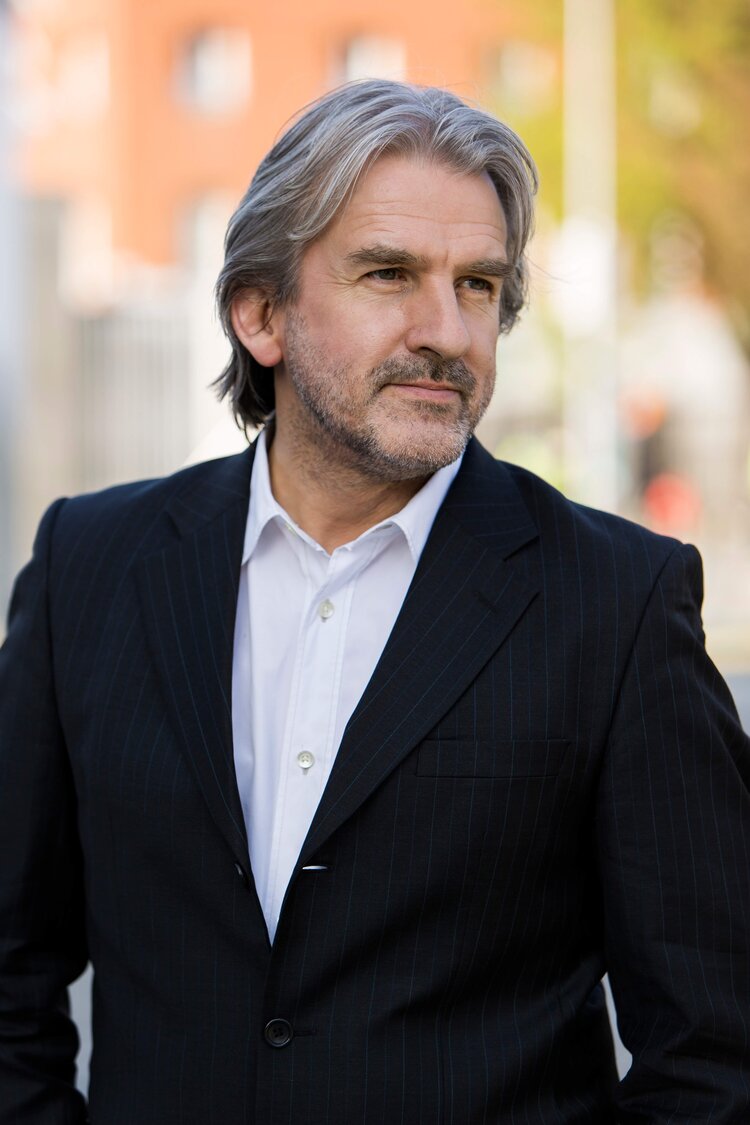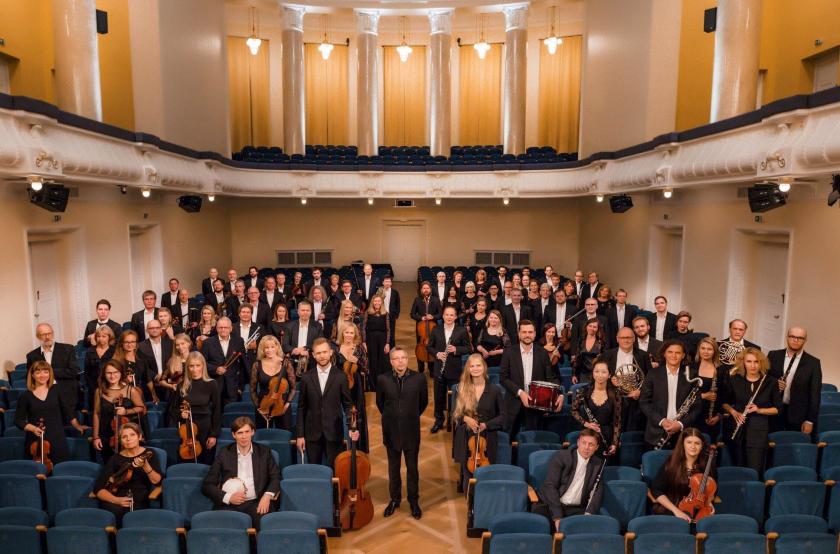Until last night, I’d only heard the Estonian National Symphony Orchestra (ERSO at home, “Riiklik” standing for “National”) live in unfamiliar contemporary epics, with Kristiina Poska and Anu Tali respectively conducting Lepo Sumera’s Fourth and Sixth Symphonies, and Olari Elts just before his 2020 appointment as Music Director championing an Erkki-Sven Tüür triptych. This was a test of how they'd fare in more familiar repertoire. They passed with flying colours.
Arvo Pärt's Cantus to the Memory of Benjamin Britten was the first work by the Estonian master I ever heard in concert, when a then also unknown Neeme Järvi,now the ERSO's Honorary Artistic Director for Life, brought the Gothenburg Symphony Orchestra to London in 1980. It had a massive impact then, and it still does, the overlapping downward scales reaching peak richness in cellos – the ERSO's department is remarkable, led by young world-class soloist Theodor Sink – and basses. Alas for the fool who applauded knowingly before the last bell's echo had died away.
 Complete stillness, fortunately, followed Barry Douglas's encore (the pianist pictured left by Eugene Langan), another lament with scalic passages, this time "October" from Tchaikovsky's The Seasons. It was a chance for Douglas to concentrate on introspective freedom, despite a powerful central climax, after the marathon of Rachmaninov's Third Piano Concerto. What a luxury to feel safe, from the very first stepwise magic, in the hands of an artist who knows exactly how to pace this tricky giant, never lapsing into excess sentimentality and preserving maximum clarity through all the labyrinthine inner lines.
Complete stillness, fortunately, followed Barry Douglas's encore (the pianist pictured left by Eugene Langan), another lament with scalic passages, this time "October" from Tchaikovsky's The Seasons. It was a chance for Douglas to concentrate on introspective freedom, despite a powerful central climax, after the marathon of Rachmaninov's Third Piano Concerto. What a luxury to feel safe, from the very first stepwise magic, in the hands of an artist who knows exactly how to pace this tricky giant, never lapsing into excess sentimentality and preserving maximum clarity through all the labyrinthine inner lines.
There was a sense that Elts and the orchestra were having to catch him at every turn – in that respect it might not have been the most collegial partnership – but they did, with the occasional woodwind solo boding very well for the concert's second half. Sometimes you feel that once-ubiquitous cuts might not be a bad thing; never here. The second half of the long first-movement cadenza raised the emotional game and held to the end of the movement, while the central fantasy of the finale really worked for once. Douglas's task seemed to be to quiet the will-o-the-wisps and petty demons which try to hinder Rachmaninov's progress to triumph.
Why Song of the Enchanter by Scottish composer Thea Musgrave before Sibelius's Fifth Symphony? The answer would have been clear with the embedding in supernatural skirls of the "swan" theme from the symphony's finale even if you didn't know the programme: hero Väinämöinen playing on his five-stringed cantele and weeping tears into the sea which become pearls. Brevity is often an asset in contemporary music, but this enchantment could have lasted for longer. It ends perfectly with the orchestral pianist - here the modestly brilliant Kärt Ruubel - strumming the piano strings into silent infinity.  Even by the benchmarks set in recent interpretations by Finnish conductors, as well as by Elts's compatriot Paavo Järvi with the Estonian Festival Orchestra, this Sibelius Fifth was a beacon of vitality. Elts (pictured above by Priit Murk) has plenty of febrile energy, but never rushes, and knows how to make the big cloudbursts work (as at least one overrated Finn never has). Parallel to Douglas's perfect sense of ebb and flow, this was another experience of total engagement. No wonder one audience member went "wow" after the combined first-movement-and-scherzo drama; we laughed approvingly. The performance also included the most striking take on the central movement I've ever heard. In his first concert with the BBC Symphony Orchestra, Sakari Oramo revealed the full miracle of the comparable "intermezzo" in the Third Symphony, and the dynamics, tempo fluctuations and unexpected colourings of this one were startling in a good way throughout. Full marks to vatic woodwind - the ERSO had the luxury of changing some co-principals after the interval, and clarinettist Soo-Young Lee is a real star – and blazing trumpets.
Even by the benchmarks set in recent interpretations by Finnish conductors, as well as by Elts's compatriot Paavo Järvi with the Estonian Festival Orchestra, this Sibelius Fifth was a beacon of vitality. Elts (pictured above by Priit Murk) has plenty of febrile energy, but never rushes, and knows how to make the big cloudbursts work (as at least one overrated Finn never has). Parallel to Douglas's perfect sense of ebb and flow, this was another experience of total engagement. No wonder one audience member went "wow" after the combined first-movement-and-scherzo drama; we laughed approvingly. The performance also included the most striking take on the central movement I've ever heard. In his first concert with the BBC Symphony Orchestra, Sakari Oramo revealed the full miracle of the comparable "intermezzo" in the Third Symphony, and the dynamics, tempo fluctuations and unexpected colourings of this one were startling in a good way throughout. Full marks to vatic woodwind - the ERSO had the luxury of changing some co-principals after the interval, and clarinettist Soo-Young Lee is a real star – and blazing trumpets.
Much as I love the Estonian Festival Orchestra at Pärnu Music Festival time, there are only so many occasions on which you want to hear Paavo Järvi's legendary encore, Valse triste. This sombre aftermath was one I'd not encountered in the concert hall, "The Death of Mélisande" from Sibelius's incidental music to Maeterlinck's play; it allows for infinite nuance in string playing, rising to a lacerating climax. You could say it was the third work of the evening, following the Pärt and Douglas's Tchaikovsky, to evoke Estonia's grieving but stalwart devotion to the Ukrainian cause. Finally, following a slow hand-clap which denoted the high presence of Estonians in the hall, we got a native crowdpleaser, Tubin's "Dance from Setu", the finale of his Suite on Estonian Dance Tunes. Generous measure, delighted audience.













Add comment